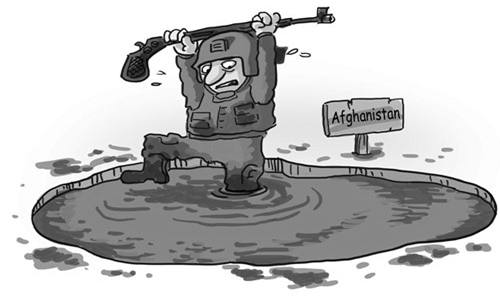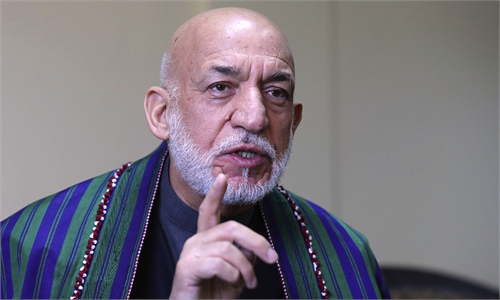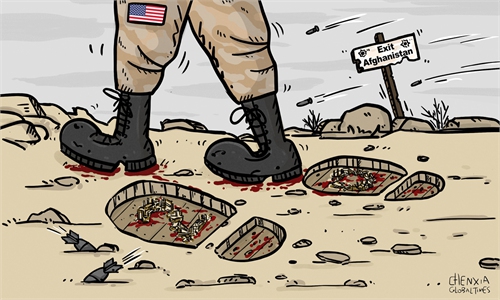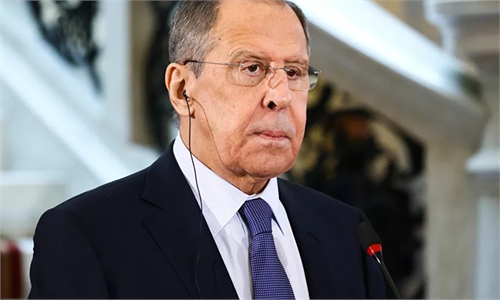Afghanistan pullout signals US faith is losing ground

Illustration: Liu Rui/GT
Twenty years ago, when the Afghanistan war was started, I was a reporter in New York.One Sunday in late fall, I was driving with a friend to Newtown, a small town in Connecticut. The editorial staff called and told me that American troops were already on the ground in Afghanistan. They asked me how the local people were reacting. The quiet life in this small town is a stark contrast to the war thousands of miles away in Afghanistan. I even remember when I interviewed two high school students in New York, they couldn't even find Afghanistan on a map.
But in accordance with President Bush's strategic vision, the fight against the terrorists of Al Qaeda was designed to ensure that Americans could have a quiet, peaceful life I've seen. US elites have even made no bones about calling this a "war of faith." Why? Because they believe that only a radical change in the beliefs of what is seen as a low-level civilization can eradicate the soil of terrorism. The small town soon faded away from my memory. That was until one day in 2012 when I suddenly saw the news that there had been a shooting incident at the town's middle school. A 20-year-old named Adam Lanza shot and killed 26 people, including 20 children between six and seven years old, plus six adult staff members. Reports at the time described the incident as "a black cloud over this area forever."
In Afghanistan, the death toll of American troops has passed 2,000. Moreover, tens of thousands of Afghans are dying or displaced, struggling between life and death.
From the US' point of view, the war may not have been a complete failure. At the very least, the two-decade-long war crushed Al Qaeda and ensured that there were no more attacks at home by outside terrorists like the September 11 attacks in 2001.
But the gunshot in Newtown is a good illustration of why the US is abandoning Afghanistan. The life of tranquility in the US has been disturbed by threats from outside, as well as dangers from within. Such shootings are a microcosm of the growing problems in American society.
A country powerful enough to send troops to fight two wars in the world at the same time is unable to deal with its own social problems. An empire that was desperately trying to spread its faith around the world through wars, looked back and found that it could no longer hold itself together.
Afghan politics has been in a state of disorder for a long time since 1978. This was essentially due to the lack of the state's ability to make various ethnic groups and tribes reach a consensus on the basis of political consultation. This of course is related to the religious beliefs of the local ethnic groups.
It will be a slow process to change Afghanistan's political ecology. The intervention of external forces through military means will only make the process more complicated and difficult. Empires in geopolitical competition always only focus on their own interests and security - this is one of the reasons why they are deeply trapped in this "graveyard of empires."
As the US troops pull out of Afghanistan, opinion columnist David Brooks published an article titled, "The American Identity Crisis" in the New York Times, in which he said, "we're probably not going to do well in battle for hearts and minds if we see ourselves abandoning our allies in places like Afghanistan."
The sentiment the author conveyed toward the US withdrawal once again proves three facts. First, the spread and expansion of Western civilization over the past 500 years relies on the support of the power of capital. The Biden administration's withdrawal decision is made based on the US capability of how much it can financially afford being involved in Afghanistan. Two decades of war in Afghanista have cost the US over 2 trillion dollars. More than 2,400 US troops have been killed, with over 20,000 injured.
Second, Brooks regretted that the US cannot continue to spread its ideals in Afghanistan any more. It seems he deliberately forgot the US military spreads values through wars. In this 20-year war, over 47,000 Afghans were killed or disabled, according to incomplete statistics. It's even harder to count the number of displaced refugees.
Third, to spread faith and beliefs to the outside, the US must build cohesion in its own beliefs. People won't believe that a US that is full of radical conflicts, shooting violence, and is seeing a widening gap between the rich and poor could become a "beacon of faith." The so-called claims that the US wants to spread faith or universal values are just excuses to conceal the war.
The author is a senior editor with People's Daily, and currently a senior fellow with the Chongyang Institute for Financial Studies at Renmin University of China. dinggang@globaltimes.com.cn. Follow him on Twitter @dinggangchina




